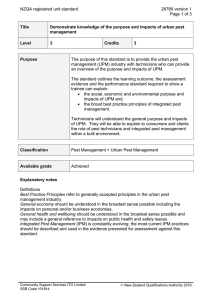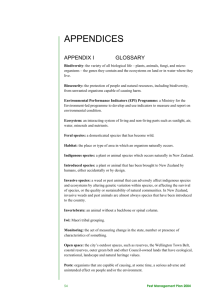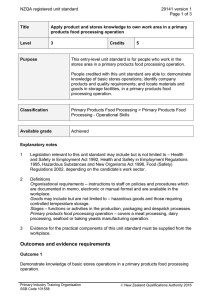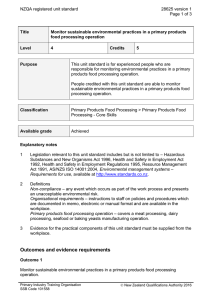NZQA registered unit standard 28789 version 1 Page 1 of 3
advertisement
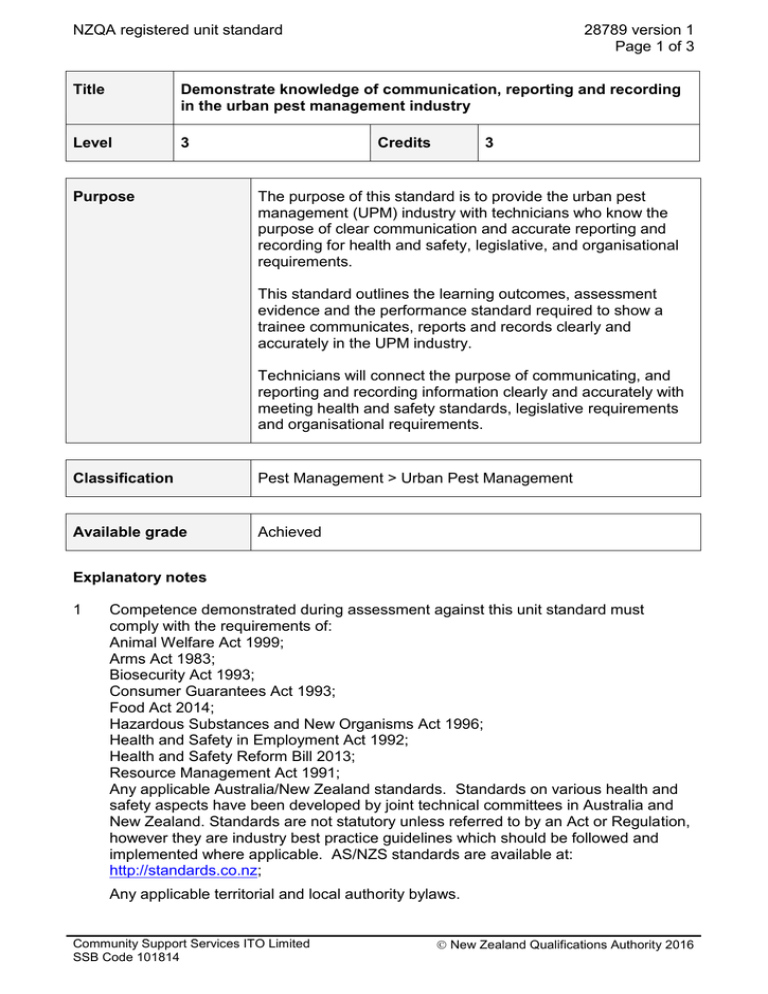
NZQA registered unit standard 28789 version 1 Page 1 of 3 Title Demonstrate knowledge of communication, reporting and recording in the urban pest management industry Level 3 Purpose Credits 3 The purpose of this standard is to provide the urban pest management (UPM) industry with technicians who know the purpose of clear communication and accurate reporting and recording for health and safety, legislative, and organisational requirements. This standard outlines the learning outcomes, assessment evidence and the performance standard required to show a trainee communicates, reports and records clearly and accurately in the UPM industry. Technicians will connect the purpose of communicating, and reporting and recording information clearly and accurately with meeting health and safety standards, legislative requirements and organisational requirements. Classification Pest Management > Urban Pest Management Available grade Achieved Explanatory notes 1 Competence demonstrated during assessment against this unit standard must comply with the requirements of: Animal Welfare Act 1999; Arms Act 1983; Biosecurity Act 1993; Consumer Guarantees Act 1993; Food Act 2014; Hazardous Substances and New Organisms Act 1996; Health and Safety in Employment Act 1992; Health and Safety Reform Bill 2013; Resource Management Act 1991; Any applicable Australia/New Zealand standards. Standards on various health and safety aspects have been developed by joint technical committees in Australia and New Zealand. Standards are not statutory unless referred to by an Act or Regulation, however they are industry best practice guidelines which should be followed and implemented where applicable. AS/NZS standards are available at: http://standards.co.nz; Any applicable territorial and local authority bylaws. Community Support Services ITO Limited SSB Code 101814 New Zealand Qualifications Authority 2016 NZQA registered unit standard 28789 version 1 Page 2 of 3 Any legislation or guideline superseding any of the above will apply for the purpose of assessment. 2 Definitions Industry best practice refers to approved/recognised Codes of Practice and Best Practice guides. This may include but is not limited to: A Code of Practice For Pest Management in the Food Industry in Australia & New Zealand 2011, available at https://www.aepma.com.au/FileDownload/667/CoP_Pest_Management_in_the_F ood_Industry-1st_Edition_pdf; A Code of Practice For the Control of Bed Bug Infestations in Australia, available at http://extension.psu.edu/pests/bedbugs/external-resources/code-of-practicebed-bugs.pdf A Code of Practice for Control and Safe Use of Fumigants, Pest Management Association of New Zealand 2008 (HSNOCOP 31-1), available at www.pmanz.co.nz. Organisational requirements refer to instructions to staff on policy procedures and methods relating to urban pest management operations (including health and safety) and the application of any written procedures which are documented in a system and are available in the workplace. Pest management services refer to any procedures undertaken during the provision of pest management and include any pre/post-service procedures. Outcomes and evidence requirements Outcome 1 Demonstrate knowledge of the purpose of clear communication in the UPM industry. Evidence requirements 1.1 The purpose of clear communication in terms of health and safety, legislation, organisational requirements and industry best practice is explained. 1.2 Appropriate communication practices and procedures are identified, explained and relate to the specific pest management services in accordance with organisational requirements and industry best practice. Outcome 2 Demonstrate knowledge of the purpose of accurate reporting and recording in the UPM industry. Evidence requirements 2.1 The purpose of accurate reporting and recording in terms of health and safety, legislation, organisational requirements and industry best practice is explained. 2.2 Appropriate reporting and recording practices are identified and explained, and relate to the specific pest management services in accordance with organisational requirements and industry best practice. Community Support Services ITO Limited SSB Code 101814 New Zealand Qualifications Authority 2016 NZQA registered unit standard 28789 version 1 Page 3 of 3 Replacement information This unit standard replaced unit standard 3256. Planned review date 31 December 2020 Status information and last date for assessment for superseded versions Process Version Date Last Date for Assessment Registration 1 16 April 2015 N/A Consent and Moderation Requirements (CMR) reference 0004 This CMR can be accessed at http://www.nzqa.govt.nz/framework/search/index.do. Please note Providers must be granted consent to assess against standards (accredited) by NZQA, before they can report credits from assessment against unit standards or deliver courses of study leading to that assessment. Industry Training Organisations must be granted consent to assess against standards by NZQA before they can register credits from assessment against unit standards. Providers and Industry Training Organisations, which have been granted consent and which are assessing against unit standards must engage with the moderation system that applies to those standards. Requirements for consent to assess and an outline of the moderation system that applies to this standard are outlined in the Consent and Moderation Requirements (CMRs). The CMR also includes useful information about special requirements for organisations wishing to develop education and training programmes, such as minimum qualifications for tutors and assessors, and special resource requirements. Comments on this unit standard Please contact the Community Support Services ITO Limited enquiries@careerforce.org.nz if you wish to suggest changes to the content of this unit standard. Community Support Services ITO Limited SSB Code 101814 New Zealand Qualifications Authority 2016

